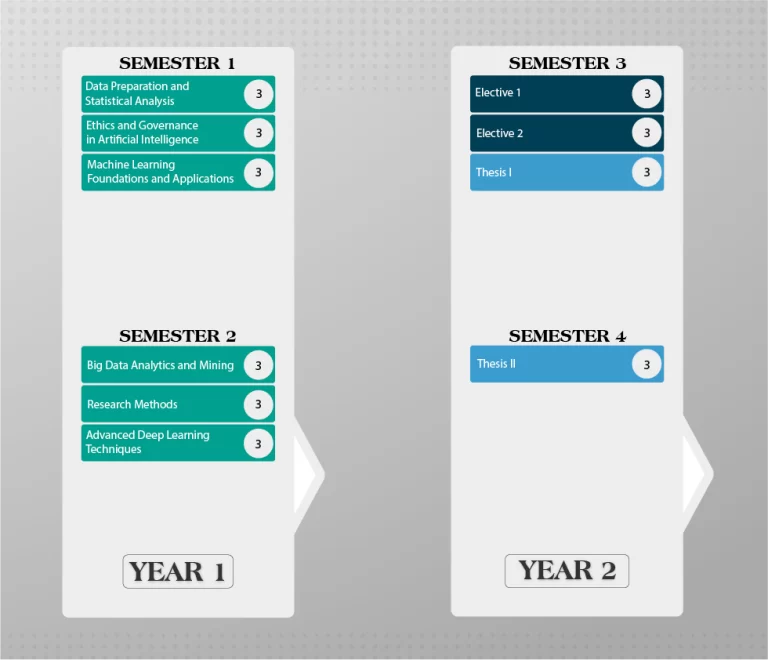Master of Science in AI and Data Science
Master the Future of Intelligence and Innovation
In an era defined by rapid digital transformation, the ability to harness the power of intelligent machines and vast amounts of data has become one of the most valuable skillsets of the 21st century. The Master of Science in Artificial Intelligence and Data Science (MSAIDS) at AUE is not just a postgraduate degree—it’s a launchpad for visionary thinkers, problem-solvers, and change-makers who are ready to lead the next wave of technological evolution.
Artificial Intelligence and Data Science are at the core of today’s most groundbreaking advancements—from predictive healthcare and autonomous vehicles to smart cities, financial forecasting, and intelligent robotics. Our MSAIDS program is designed to prepare students for the profound impact these technologies are having—and will continue to have—on society, industries, and human potential.
This program offers more than technical mastery. It is a transformative academic journey that combines rigorous scientific foundations, hands-on experience, and ethical foresight. Students will engage with complex datasets, develop intelligent systems, master machine learning and deep learning techniques, and explore the legal, societal, and ethical dimensions of AI in a globalized world.
What Makes Our Program Unique?
At AUE, we don’t just teach AI and Data Science—we cultivate innovators who will define its next frontier. Here’s what sets our program apart:
- Cutting-Edge Curriculum: A strategically designed sequence of courses that covers data engineering, machine learning, deep learning, ethics, research methodologies, and specialized topics in computer vision, NLP, decision systems, and intelligent agents.
- Hands-On Thesis Experience: Our two-stage thesis journey enables students to dive into real-world research and contribute original work to the field under expert supervision.
- Future-Ready Specializations: With electives in cloud-based AI, robotics, digital image processing, and cognitive systems, students gain practical skills aligned with industry’s evolving needs.
- Global Perspective, Local Relevance: We prepare students to address global challenges while responding to UAE and regional demands for AI innovation, ethical governance, and data-driven decision-making.
- Expert Faculty & Research Culture: Learn from faculty actively engaged in groundbreaking research and supported by a thriving academic ecosystem that values innovation and collaboration.
Who Should Join This Program?
This program is ideal for professionals and graduates with a background in computing, engineering, mathematics, or related fields who want to become leaders in AI, machine learning, and data science. Whether you aspire to be a data scientist, AI engineer, or applied researcher, this is your launchpad.
Program Mission
To develop highly skilled AI and data science professionals capable of designing intelligent systems, analyzing complex datasets, and making ethical, data-driven decisions that transform industries, drive innovation, and serve society.
Program Learning Outcomes
Graduates will be able to:
- Identify, analyze, and define complex AI and Data Science problems, applying advanced principles of computing, mathematics, and domain-specific knowledge to develop effective and innovative solutions.
- Design, develop, and evaluate sophisticated AI and Data Science models, algorithms, and systems that address real-world challenges, considering factors such as scalability, performance, and constraints.
- Apply advanced mathematical, statistical, and computational methods to model data, derive insights, and create state-of-the-art machine learning and AI-based solutions.
- Demonstrate an understanding of ethical, legal, and societal implications of AI and Data Science, making informed decisions that promote fairness, transparency, and responsible use of data.
- Develop leadership skills to lead interdisciplinary teams effectively, communicate technical information and data-driven insights clearly, and collaborate efficiently in AI and Data Science projects.
- Continuously acquire and apply new knowledge in AI and Data Science, adapting to evolving technologies, methodologies, and industry standards with an emphasis on research and innovation.
Program Goals
Goal 1. Equip students with specialized knowledge and skills to solve real-world challenges.
Goal 2. Instill ethical practices and promote responsible AI.
Goal 3. Foster lifelong learning and adaptability to evolving technologies.
Goal 4. Develop leadership and interdisciplinary collaboration skills.
Goal 5. Promote innovation and research for impactful solutions.
Career Opportunities
Graduates of the MSAIDS program will be prepared to pursue roles such as:
- Data Scientist
- Machine Learning Engineer
- AI Researcher
- Business Intelligence Specialist
- Deep Learning Architect
- AI Policy and Ethics Advisor
- Cloud AI Developer
- Intelligent Systems Designer
These roles span industries including finance, healthcare, government, manufacturing, cybersecurity, retail, and transportation.
ADMISSION REQUIREMENTS
Admission to the Master of Science in Artificial Intelligence and Data Science (MSAIDS) program is governed by AUE's Graduate Admission Policy and Procedure and is fully compliant with the Commission for Academic Accreditation (CAA). Applicants holding a recognized bachelor's degree in Artificial Intelligence, Computer Science, Computer Engineering, Software Engineering, Information Technology, Computer Information Systems, Data Science, Electrical/Electronic Engineering, or a closely related field, with a cumulative GPA of 3.0 or higher (on a 4.0 scale), are granted regular admission, while applicants who do not meet the criteria for regular admission may be considered for admission on probation based on their academic background and cumulative GPA, subject to clearly defined conditions.
Applicants admitted on probation are required to complete designated courses under the Academic Readiness and Competency Program (ARCP), which is designed to address foundational competency themes in (1) programming, data structures, and algorithms, and (2) artificial intelligence, to ensure adequate preparation for graduate-level study. The number of ARCP courses assigned and whether limited enrollment in master-level coursework is permitted during the probationary semester is determined by the Program Director or Student Advisor with the approval of the Dean, in accordance with the approved GPA bands and field-of-study categories. ARCP courses are assessed on a Pass/Fail basis, do not count toward the master's degree credit hours or cumulative GPA, and must be successfully completed within the probationary period; failure to meet the specified probationary requirements, including minimum performance in any permitted master-level course, results in automatic dismissal from the program. English language proficiency and all other general graduate admission requirements remain applicable in all cases.
ACCREDITATION
PROGRAM STRUCTURE
Course Category
Total Number of Courses
Total Number of Credit Hours
Core Courses
6
18
Elective Courses
2
6
Thesis Course
2
6
Total
10
30 Credit Hours
PROGRAM Courses
Core Courses
18 CREDIT HOURS
Elective Courses
6 CREDIT HOURS
Thesis
6 CREDIT HOURS
This course is a continuation of Thesis I and is designed to guide students through the later stages of their thesis journey, focusing on advancing their research from data collection through to the final oral defense. Students will refine their research methodology and
techniques as needed, analyze their findings in depth, and ensure that their thesis reflects a comprehensive understanding of their research problem. This course culminates in a formal public defense of the completed thesis, where students will articulate their research
contributions and respond to questions from faculty and peers.
RECOMMENDED STUDY PLAN

Program Director

Prof. Faruq Al-Omari
Acting Program Director of the Master of Science in AI and Data Science


